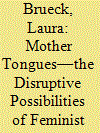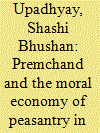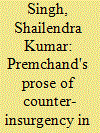| Srl | Item |
| 1 |
ID:
175490


|
|
|
|
|
| Summary/Abstract |
This essay considers the methodological intervention of understanding a ‘mother tongue’ (matribhasha) as a gendered vernacular. It seeks to illustrate the subversive potential of the vernacular as a gendered lens though which we can understand the Dalit feminist critiques of caste hierarchies and Dalit and non-Dalit patriarchies, and the places they intersect. The essay considers the works of Anita Bharti and Meena Kandasamy, contemporary Dalit women authors who write in Hindi and English, respectively. Thus, this paper extends the definition of the vernacular beyond the confines of linguistic and regional specificity, allowing for a feminist reclamation of the term.
|
|
|
|
|
|
|
|
|
|
|
|
|
|
|
|
| 2 |
ID:
106503


|
|
|
| 3 |
ID:
144357


|
|
|
|
|
| Summary/Abstract |
This article suggests that the prose of counter-insurgency, as defined by Ranajit Guha, serves as a theoretical yardstick against which Premchand's discourses about peasants can be measured. This is possible, however, only if Guha's scope is broadened beyond historiography to incorporate fictional as well as journalistic writings. For someone who represents the plight of the peasant with incisive historical accuracy, Premchand's implied corrective for the peasant amounts to a radical departure from the status quo in the United Provinces. In Premchand's non-fictional prose, vis-à-vis the peasant uprisings of Awadh, there are only tangential references or a studied silence; however, his fictional works reveal the rationality of peasants, despite his insistence on compassion, rectitude and integrity. Nevertheless, he never presents peasant discontent as a collective enterprise; the alternatives are provided by the writer's leap of faith, either with the zamindar (landlord) or the sarkar (government). Premchand's literary corpus thus acts as a prose of counter-insurgency that reads peasants' protests as a threat to the social order and an impediment to the nationalist movement for swaraj (self-rule), thereby either relegating it to the peripheral spaces or discarding it altogether.
|
|
|
|
|
|
|
|
|
|
|
|
|
|
|
|